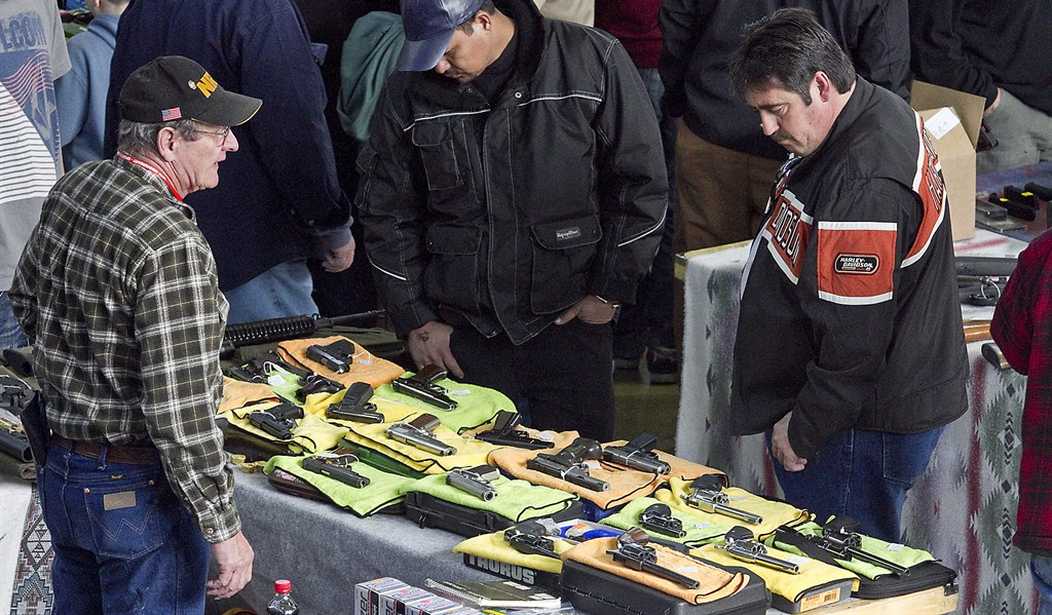Massachusetts lawmakers are poised to approve several new restrictions and regulations on legal gun owners next week when the legislature’s Public Safety and Homeland Security Committee meets to discuss more than a dozen different gun control bills, including “universal background checks”, more restrictions on magazine capacity, and a mandate that legal gun owners purchase firearms liability insurance.
“We’ve proven to be the NRA’s worst nightmare, and we can’t afford to cede any ground in this fight,” says John Rosenthal, a gun owner and founder of Stop Handgun Violence, a Beverly-based advocacy group that pushes for tighter gun control. “We’ve shown that gun laws can work without infringing on the rights of law-abiding gun owners.”
Rosenthal’s absolutely wrong when he says that Massachusetts gun laws don’t infringe on the rights of law-abiding gun owners. In fact, as we’ve noted here several times, gun control groups and pro-gun control researchers point to Massachusetts as an example of how the state’s gun laws prevent law-abiding residents from exercising their 2nd Amendment rights.
While a background check is more often than not quick and hassle-free, gun licensing in, for example, Massachusetts is a weeks- or months-long process that requires submitting a photograph and fingerprints, passing a training course, and going through one or more interviews, all involving law enforcement. That adds significant barriers for even a would-be gun owner who has no ill intent or bad history.
“The end impact is you decrease gun ownership overall,” Cassandra Crifasi, a researcher (and gun owner) at the Johns Hopkins Center for Gun Policy and Research, previously told me, discussing Massachusetts’s laws. “Lots of folks think, ‘Well, it’s probably not worth going through all these hoops to buy firearms, so I’m not going to buy one.’ And then you have fewer firearms around, and less exposure.”
Massachusetts gun policy is designed to frustrate law-abiding residents who want to exercise their rights to keep and bear arms. It’s ridiculous to assert that the state’s laws “work without infringing” on anyone’s rights. The whole point of their system is to ensure that there are fewer legal gun owners in the state.
One proposal, filed by Rep. David Linsky, D-Natick, would require private sellers to conduct a transfer or sale through a licensed firearms dealer, who would run a background check on the buyer. The bill is co-sponsored by 39 lawmakers including Reps. Jim Kelcourse, R-Amesbury, Ann-Margaret Ferrante, D-Gloucester, and Andy Vargas, D-Haverhill.
Licensed gun dealers are already required by federal law to screen buyers for a criminal record, history of mental illness or other factors preventing a gun sale. But background checks aren’t required for private sales at gun shows, or between family and friends.
Gun control advocates call it a “dangerous loophole” that allows criminals and mass murderers to circumvent the process of purchasing weapons illegally.
Critics of the proposal say an extra layer of background checks will complicate transactions for legitimate buyers and sellers, and will be ineffective in preventing illegal sales.
“Criminals don’t go through retailers to buy firearms, they’re getting them on the street,” said Jim Wallace, executive director of the Gun Owners Action League of Massachusetts, which is affiliated with the National Rifle Association. “This is sound-byte legislation that won’t do anything to protect public safety or reduce illegal gun sales in the state.”
Other bills aimed at legal gun owners include an expansion of the state’s ban on magazines with a capacity of more than ten rounds. Currently, magazines manufactured before 1994 are exempt from the ban, but one bill would require anybody who currently possesses those magazines to turn them over to police, destroy them, or remove them from the state. A similar law in California is currently on hold thanks to a challenge in federal court, while New Jersey’s ban on the possession of “large capacity” magazines has been upheld by the federal 3rd Circuit Court of Appeals and is in effect, though there’s been massive non-compliance with the law.
Other proposals would require Massachusetts gun owners to obtain liability insurance and get at least five hours of live-fire training before getting a state firearms license.
Gun rights advocates question the need for tighter restrictions, saying the state’s tougher rules haven’t reduced overall gun violence in the state.
“They’re desperate to show the country that they’re leading on this issue, when in fact they’re failing,” Wallace said. “They’re just throwing stuff at the wall and hoping it will stick.”
Each and every one of these proposed bills takes aim at the legal and lawful gun owners in the state. Remember the words of Cassandra Crifasi, that researcher at Johns Hopkins. If these bills become law, lots of folks will think “Well, it’s probably not worth going through all these hoops to buy firearms, so I’m not going to buy one.” The gang member in Dorchester who shot two teenagers on the street a couple of weeks ago won’t care if any of these gun control proposals become law. The gang violence in Worchester won’t decline if the number of law-abiding gun owners in the city drops by another 10 or 20 percent. These bills aren’t about public safety. Instead, they’re all about disarming the public through increased bureaucracy, red-tape, and laws designed to prevent legal gun ownership.









Join the conversation as a VIP Member